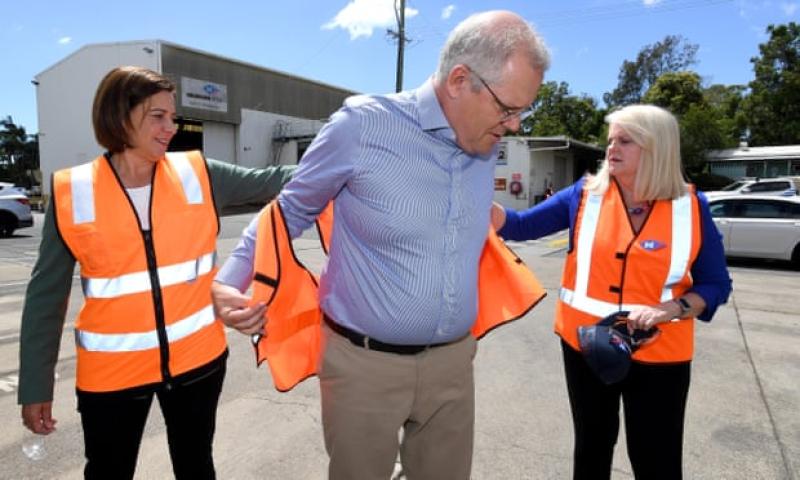Is an acceptance that politics is a game feeding a weary cynicism about the whole exercise of democracy?
By: Ellen Fanning (the Guardian - Australian Politics)


All the world's a stage, And all the men and women merely players; ... (As You Like It)
Western democracy is under threat of being trivialized by political actors reading the script and playing a part. Political leaders in western democracies have stopped governing. The political imperative for the players in western democracies has become crafting the narrative so all the players read from the same script.
Over the last four decades 'democracy' has become a populist aphorism for technocratic government used by western liberals and neoliberals, alike. The unelected technocracy has become the political tool for governing. Politicians are only required stand on the political stage, declare their faith in the technocracy, and deliver their scripted catchphrases. But the bureaucratic meritocracy envisioned by political players has become an autocracy.
Politics has changed little over the last four decades; politicians are still engaged in polemic gamesmanship to score winning points. But the technocracy is no longer the servant of political government. The technocracy crafts the narrative that political actors must deliver on the public stage. The wants, needs, and desires of the technocracy has become the purpose for governing.
Acceptance that politics is just a game really is recognition that politicians are no longer that important for governing. Democracy doesn't matter because elected political leaders aren't in charge. Liberals and neoliberals actually destroyed the purpose of democracy decades ago.

There are days when the most challenging part of my job is not to fall off my chair in response to some breathtakingly candid comment from a panellist.
Here's an example. Last month, we were discussing the PM's bold announcement that despite signing on to a request for countries to strengthen their 2030 emission reduction goals by next year, just hours later, Morrison declared his government had no intention of doing anything of the sort.
Panellist: "Scott Morrison has one job - I'm not defending him, just want to make that very plain - he's got one job at the moment - that job is: win the next election."
Me: "You serious?"
Panellist: "Yeah, course."
The Australian parliament, the whole arse-covering and ego-driven apparatus, should be paralysed by shame and remorse | Katharine Murphy Read more
Me: "He's the prime minister of Australia and you say his only job is to win the next election?"
The panellist, who had earlier explained he was indeed anxious for effective action on climate change, looked at me blankly and explained, well yes. That's just how politics works. A singular focus on winning was indeed everyone's expectation of Morrison: the PM's himself, the Liberal party's, and indeed it was simply the convention in politics. Winning. Duh.
As the exchange became more tense and the panellist increasingly baffled, I explained: "I made a promise to myself a couple of weeks ago that whenever anybody treated politics as a game on this program, I would pull them up."
Why? Because any acceptance that politics is just a game reinforces the idea that the only real aim of the whole effort is power. To remain in power. And that nothing is possible unless you play it like this.
In his newly published profile of the prime minister, The Game: A Portrait of Scott Morrison, author Sean Kelly notes the idea that politics is a game - a sport - infects political reporting. "For example, in reporting on the Medevac legislation much focus was on the political effect of the new laws and their impact on the election. The suffering of real people vanished, replaced by the discussion of the game of politics."
"Everything is analysed in terms of the political strategy being pursued … removed from the realm of literal meaning, taking place in an area in which everything has a hidden meaning," Kelly writes.
Now clearly not everything was analysed in these terms. The desperate need to ensure asylum seekers, kept in offshore detention, had access to timely, quality medical care was well covered in many quarters.
But the second, dispiriting, depressing, demoralising beat of the discussion was always how the issue of immigration remained a powerful, if toxic, political issue. A "winner".
What if this sort of blank-faced acceptance of the political status quo, the hidden political meaning of every exercise of executive authority, is turning people off even more than outright corruption and pork barrelling? What if it's this brand of discourse that's feeding a weary cynicism about the whole exercise of democracy?
In fact, lately I've wondered, what if turning people off is the whole point? What if the aim of cynical politicking is to repel us with objectionable political behaviour and the attendant giddy media reflections of who's winning, who's losing, who gets the bragging rights? The result being we disengage and leave politics to the political insiders?
In the past week, it was possible to hear endless discussions about a proposed federal anti-corruption commission without hearing much detailed discussion of the competing drafts of proposed legislation.
How much power should the "political police" have? Should commission hearings be held in public? Who should be allowed to blow the whistle on corruption in public life? Much reporting was just about the politics.
Why wouldn't ordinary people feel left out?
Some years ago, at what I imagine my host thought to be a high-powered dinner party (what on earth was I doing there, I still wonder) a corporate insider (female, not a regular Drum guest) gently took me aside and asked me why I didn't have more "proper people" on the program.
I sensed she was speaking about herself. Perhaps more out of boredom than a genuine sense of curiosity, I asked what were the recognisable features of a "proper person". She explained that they were senior people who already had a voice in politics and corporate life. Those who already had power. That's who we should be listening to on the 6pm ABC nightly current affairs program, a show dedicated to a broad discussion of the social, political and community issues of the day.
Glass of wine in hand, I pushed on relentlessly, to get her to the bottom of this idea of "the proper person". "Who isn't a proper person?" I asked. Sensing things were becoming awkward, this woman replied it was those younger people, people you've never heard of … you know, not "proper people".
Senate inquiry calls on Scott Morrison to give personal explanation over car park fund Read more
With a federal election looming and so much at stake, and with Labor pursuing a "small target" approach to policy, perhaps we could re-imagine coverage of this election campaign as listening to voices of "improper people".
Heaven knows enough of them have had their lives and businesses affected by bushfires, Covid and recession, not to mention the general dismay at the blowing up of 40,000-year-old sacred sites.
If we deliberately engineer civil discussions between a diverse range of people - drawing on people from different parts of the country, with different cultural, linguistic and ethnic roots, varying sexual orientations, ages and socio-economic backgrounds, the coming election will be an opportunity to reclaim and enrich our politics rather than just becoming a few weeks of high-vis campaign cosplay to be endured.
They are best placed to reflect on what policies actually mean for their communities and the nation. And importantly, if both major political parties maintain a "small target" approach to the election, limiting any grand policy announcements, the election period might provide an opportunity for the people to imagine what future they want for our society, and how we might get there.
Now, the panellist I mentioned was former NSW Liberal MP Stephen O'Doherty. He's a man of faith and conviction. He's not a paid lobbyist but he uses his insider's knowledge of how politics works in this country to lobby MPs.
Currently he's working - pro bono as always - on ways to get music education resumed in schools following Covid shutdowns and for targeted financial assistance for musicians who have lost income over the past two years due to government-imposed Covid restrictions.
Off air, he asked me if I really thought it was wrong for him to leverage his insider status in this way?
Clearly, I don't. Stephen O'Doherty is one of the good guys. He is pursuing worthy causes that need support from people like him with access and influence. That's the whole thing about insiders. They can do what outsiders can't.
My point is, if we care about the future of the public square, and we aren't seeking to undermine it, we can't afford this distinction between insiders and outsiders, proper people and improper people, any more.





“Life is just like a game. First you have to learn rules of the game. And then play it better then any one else.” ― Albert Einstein